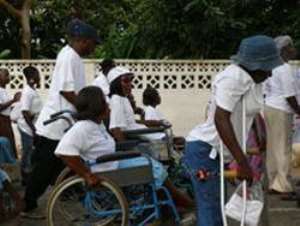
Discrimination against disability people in Ghana over the years, people with disability in our country faces a lot of problems from stigmatization through to discrimination. People feels awkward in dealing with people with disability.to some extent they treat them as if they are not human beings. Disabled people in Ghana continue to experience various forms of discrimination and social exclusion.
Disability discrimination is when a person with a disability is treated less favorably than a person without the disability in the same or similar circumstances. For example, it may be indirect disability discrimination if the only way to enter a public building is by a set of stairs because people with disabilities who use wheelchairs would be unable to enter the building. In spite of the reality that there are a few anti-discriminatory laws that are implied to ensure the rights of disable individuals and encourage their interest in standard social, political and financial exercises.
the article 29 clause 1 a, b and c state that "No person in any manner shall (a) Exploit a disabled person;(b) discriminate against a disabled person; or (c) subject a disabled person to an abusive or degrading treatment.
Disabled people are one of the largest troubles and discriminate groups in Ghana, making up an estimated 3% of Ghana’s population of 25 million.
Various institution in our country does not provide a space for disable people. Disabled people, therefore, continue to experience social stigma, social exclusion and discrimination. the most significant contributory factor to the downgrading of disabled people in Ghana now is the weakness in aspects of the legal and regulatory structures meant to protect them.
The laws have been designed to challenge the traditional beliefs but, as at now, the traditional beliefs appear to be holding out very well against the anti-discrimination legal regime.
the job training and employment opportunities that are supposed to be provided by the state under the law are almost non-existent.
Some of the laws requires that the state sets up rehabilitation centers in various regions in the country to train disabled people and also facilitate their employment. These initiatives have yet to be actively pursued, even though many disabled people have had to resort to begging to make a living.
Disabled people who decide to challenge the discrimination they face by advocating for themselves are sometimes compelled to submit themselves to corrupt practices by making several official and unofficial payments at so many levels before get what they want. Failure to pay may delay their service or prolong their justice.
Disabled people seem not to have the power, except that which the authorities decide that they should have. Sometimes, some disabled people perceive themselves to be unworthy of respect and social recognition This is because there appears to be no sustained and concerted effort on the part of the state aimed at empowering disabled people for them to know their rights or educating non-disabled people for them to desist from stigmatizing disabled people or even taking actions against people who discriminate against disabled people.
The state and some of its constitutional bodies, such as the Commission on Human Rights and Administrative Justice and the National Commission on Civic Education, which are supposed to be the vanguards of the rights of its citizens are either looking on while disabled people continue to suffer from a disabling society or ignoring the oppression of disabled people despite numerous calls for attention towards that.
In conclusion, The Disability Act needs serious amendment. simple terms, disabled people in Ghana are not equal citizens under the law as it stands, because their rights are not fully recognized and actively protected. As long as the Act remains in its present state, disabled people will continue to suffer many forms of hardship in their social lives, and what ought to be considered as a matter of protecting the social rights of disabled people will be seen as social welfare provision
The definition of disability as contained in Ghana’s laws ought to be amended for it to incorporate the realization that society and the environment play an active role in disabling disabled people. The state cannot and should not allow negative beliefs about the functional incapacity of disabled people, repressive traditional beliefs and supposed financial constraints – to get in the way of the rights of disabled people.




 List of 24 ministerial nominees approved by Parliament
List of 24 ministerial nominees approved by Parliament
 You were my inspiration, made me who I am today – Lilian Kumah
You were my inspiration, made me who I am today – Lilian Kumah
 Rainstorm destroys Hohoe E.P. Senior High School building
Rainstorm destroys Hohoe E.P. Senior High School building
 John Kumah strongly supported me to become NPP flagbearer – Bawumia reveals
John Kumah strongly supported me to become NPP flagbearer – Bawumia reveals
 Late John Kumah urged me to run for NPP flagbearer, strongly supported me — Bawu...
Late John Kumah urged me to run for NPP flagbearer, strongly supported me — Bawu...
 Akufo-Addo appoints Joseph Kpemka as Deputy MD of BOST
Akufo-Addo appoints Joseph Kpemka as Deputy MD of BOST
 Ablakwa petitions CHRAJ to investigate sale of SSNIT's hotels to Rock City Hotel
Ablakwa petitions CHRAJ to investigate sale of SSNIT's hotels to Rock City Hotel
 MoF to provide new bailout for defunct Gold Coast Fund investors – Bawumia revea...
MoF to provide new bailout for defunct Gold Coast Fund investors – Bawumia revea...
 OMCs implement price adjustments despite International petroleum price declines
OMCs implement price adjustments despite International petroleum price declines
 Petition to remove Kissi Agyebeng will disrupt operations of OSP – Martin Kpebu
Petition to remove Kissi Agyebeng will disrupt operations of OSP – Martin Kpebu
